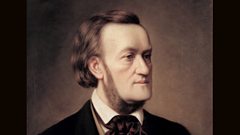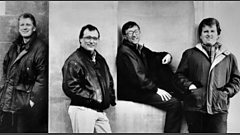Rosalyn Tureck, Hilliard Ensemble, Wagner on Screen, Mussorgsky
Tom Service presents a portrait of pianist Rosalyn Tureck. Plus vocal group the Hilliard Ensemble at 40, Wagner as portrayed on screen and a book on Mussorgsky and his circle.
Tom Service with a portrait of Rosalyn Tureck, the High Priestess of Bach as the legendary American pianist was labelled, in her centenary year. Also, the Hilliard Ensemble, the British vocal group specializing in both early music and contemporary repertoire, turns 40. We talk to present and former members, and eavesdrop on a rehearsal. Also, as Radio 3 continues the celebrations of Wagner anniversary this weekend, we examine how the composer has been depicted on the screen, big and small, over the last 100 years. And we talk to Stephen Walsh about his book Mussorgsky and his circle, and we review it with Russian experts David Nice and Marina Frolova- Walker.
Last on
More episodes
Clip
-
![]()
Wagner on Film by David Huckvale
Duration: 07:53
Chapters
-
Rosalyn Tureck
Duration: 11:41
The Hilliard Ensemble
Duration: 11:17
Wagner on Film
Duration: 08:42
The Mighty Handful
Duration: 11:23
Rosalyn Tureck
![Rosalyn Tureck]()
Rosalyn Tureck, the High Priestess of Bach as the legendary American pianist and harpsichordist was labelled, was born a century ago and this year also marks ten years since her death. Born in Chicago she was a well-known child prodigy and made her debut at Carnegie Hall playing the Theremin! Tureck’s approach to music wasn’t just a technical one but a philosophical one too. Towards the end of her life she established what’s now known as the Tureck Bach Research Institute. She wrote books on playing Bach, gave televised lecture-recitals and sold out concert halls all over the world playing his solo repertoire – as well as inspiring Glenn Gould. Tom Service assesses Tureck’s legacy with Kevin Kleinmann, a close colleague and friend who is now President of the Tureck Bach Research Institute, Canadian pianist and Bach specialist Angela Hewitt and Misha Donat who produced some of Tureck’s recording sessions for the ±«Óătv, along with archive material of Tureck herself.
Ěý
More information:
The Hilliard Ensemble
![The Hilliard Ensemble]()
For forty years the four men of the Hilliard Ensemble have explored a repertoire that covers almost the entire gamut of Western music from the earliest polyphony of Perotin to contemporary collaborations with Arvo Part and saxophonist Jan Garbarek. After four decades creating a unique performance practice for four-part vocal polyphony, they will retire next year after a celebratory season. Of the current line-up of countertenor, two tenors, and baritone, one of them – David James, the countertenor – has been there since the beginning. Tom reunites David with two of the other founding members – Paul Elliott and Errol Girdlestone to recall how it all started back in 1973 and then eavesdrops on a rehearsal for the groups 40th Anniversary Concert and talks to the other current members – Rogers Covey Crump, Steven Harrold and Gordon Jones.ĚýĚý
More information:
Ěý
Wagner 200 - Wagner on Film
![Wagner 200 - Wagner on Film]()
As ±«Óătv Radio 3 continues its celebrations of Wagner’s bicentenary this weekend, writer and broadcaster David Huckvale examines how the composer has been depictedĚý on the screen - big and small - over the last 100 years.Ěý Starting with Giuseppe Becce in Carl Fröhlich’s 1913 silent bio-pic, (which will be shown at the Barbican Centre in London on 12th January 2014 with a live piano accompaniment composed and played by Jean Hasse) David charts Wagner’s filmic journey via the 1955 Hollywood film Magic Fire, directed by William Dieterle and starring Alan Badel & Peter Cushing, Ken Russell’s Lisztomania with Paul Nicholas as Wagner, Lyndon Brook’s portrayal in Song Without End through to Richard Burton in Tony Palmer’s epic seven and three quarter hour film from 1983 simply called “Wagner.”
More information:
Mussorgsky and His Circle
![Mussorgsky and His Circle]()
The extraordinary group of Russian composers who came together in St .Petersburg in the 1860s – the “Mighty Handful” or simply “The Five”ĚýĚýĚý Mussorgsky, Borodin, Cui, Balakirev and Rimsky-Korsakov - gave rise to one of the most intriguing and colourful stories in all musical history. Stephen Walsh, Professor of Music at Cardiff University and author of several books on music talks to Tom about his new book Mussorgsky and His Circle which tells the story of these composers who with no or little musical education created works of lasting significance. Tom is also joined in the studio by Russian music experts David Nice and Marina Frolova- Walker to review the book.
Ěý
More information:
Credits
Role Contributor Presenter Tom Service Interviewed Guest Stephen Walsh Interviewed Guest David Nice Interviewed Guest Marina Frolova-Walker Broadcast
- Sat 7 Dec 2013 12:15±«Óătv Radio 3
Featured in...
![]()
Wagner 200—±«Óătv Proms, 2013
A collection of Wagner programmes and clips from Radio 3 and the 2013 Proms season.
Knock on wood – six stunning wooden concert halls around the world
Steel and concrete can't beat good old wood to produce the best sounds for music.
The evolution of video game music
Tom Service traces the rise of an exciting new genre, from bleeps to responsive scores.
Why music can literally make us lose track of time
Try our psychoacoustic experiment to see how tempo can affect your timekeeping abilities.
Podcast
-
![]()
Music Matters
The stories that matter, the people that matter, the music that matters









